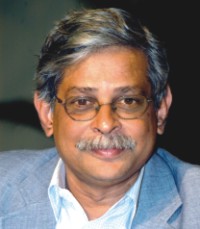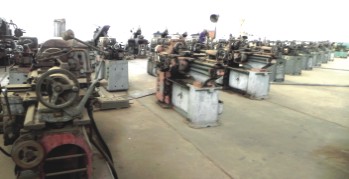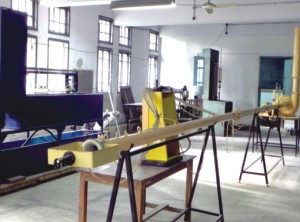| Home - Back Issues - The Team - Contact Us |
 |
| Volume 10 |Issue 19 | May 20, 2011 | |
|
|
Education Engineering the Future of Engineers AANTAKI RAISA The highways we drive on, the vehicles we ride in, the bridges that have connected the country, the computer one is using, the building one is living in- all are the creations of engineers. Engineers are the shapers of the modern civilisation, the brightest minds of a country. Though Bangladeshi engineers are excelling at their fields abroad,only a handful are staying home to develop the engineering industry in Bangladesh. What is causing our engineering students to leave the country and serve others rather than their own nation? If you ask an engineering student about her/his future plan after completing undergraduate studies, the most common comment may well be: 'I will go abroad for Masters or PhD'. There are other plans like 'I shall do an MBA so that I can get a well-paid job' or 'I will do my Masters from BUET and then try to get into a job'. Most, if not all engineering students who plan to stay in Bangladesh want to stay for a good job in or out of their own fields. The students who plan to go abroad can be divided into two categories: first, those who plan to come back home and use their acquired knowledge from abroad in their own country and second, those who have already decided they want to settle in a foreign country. Sadly one will hardly find students falling into the first category and myriads of enthusiasts falling into the second. Engineering students, who plan to go abroad have their own varied reasons for doing so. Zikhir, an electrical and electronics engineering (EEE) student at Chittagong University of Engineering Technology (CUET) says that Bangladeshi universities do not have enough facilities to conduct high-level research work. According to him, “though our ground level research facilities are fine our high level facilities are poor even compared to neighbouring countries like India, China or Malaysia.” He also thinks that educators at the institutes join the universities to work for a year or two and then go abroad with scholarships for PhDs. With the educators themselves not devoted enough, it's only natural that students will not be benefited as engineering students. He also mentions another major hurdle, that of getting funding for research. “The bureaucratic process we have to go through to get a fund for a research work is so time consuming and frustrating that most of the students don't even apply for university funding,” complains Zikhir. Mahmudul Islam Khan, a civil student at CUET says that having a foreign Masters degree is essential for his career. As the best universities for mechanical engineering are in the North America, a degree from there would put in more value to his resume. This is why students tend to go abroad for higher studies, despite the huge financial burden it entails as well as low standard of life. Shible Noman, a mechanical engineering student, also in CUET, says that staying home, whether for higher education or to find a good job is not an easy decision. Most of his seniors in university have taken the conventional route abroad and there are not many examples he knows of people staying back and making it big. All these students have different reasons for leaving home. But most of them are not particularly enthusiastic about coming back. A good job and secure life seem to be great incentives to stay on abroad. Very few students like an Urban Planning student at CUET Nasrin Akter wants to come back and help her country with her acquired knowledge, even if she gets lucrative jobs abroad. There have been, however, students who have excelled in their fields but decided to stay or come back to Bangladesh. According to some in this group, students like Shible or Zikhir lack patriotism and that's why they don't want to come back. Md Ruhul Amin, a lecturer at the Computer Science and Engineering (CSE) department in Shajalal University of Science and Technology (SUST) was offered a job at Google after graduating from CSE in SUST but he decided to decline the offer. He says, “This generation of students are not daring enough to take the challenge of building their own country. Their highest ambition is to join Google or Microsoft. They don't realise that serving one's own nation is a much more satisfying feeling than working in a foreign company.” According to him the outflow of engineering students is due to the lack of job security in Bangladesh. “But we are trying to create a culture of engineering entrepreneurship so that engineering students can have their own enterprise. This will not only create opportunities for the new engineers, it will also boost engineering industry,” adds Amin. He says that the countries our students want to move to, like those in North America or Europe, once were like Bangladesh; their students, their engineers with persistence and hardship brought their countries to where they are now. Bangladesh needs the service of her bright minds for her own development. Though inspiring individuals like Amin are not very few, the number of outgoing engineers is not decreasing. Javed, a CSC graduate from North South University, wants to settle abroad because his lifestyle or the things he wants to do just do not match with the way of life in Bangladesh. This is not just the engineering job opportunities or limited facilities that bother him, the political and socio-economic scenario, and extremely dense population are the reasons he wants to move to a 'quieter place'. He says he thinks 'in a global manner'. Dr Muhammed Zafar Iqbal, head of the CSE department at the SUST says, “When an American scientist goes to Fiji for a research work, then it is called thinking in a global manner. When a Bangladeshi student goes to North America or Europe, that's leaving his country. I never hear students working in Nepal or going to Africa for research work.” Dr Iqbal believes as our economy is not yet at a strong hold, students do not feel secure enough to stay. If and when we go through the technological and economic revolution that India has gone through, our students will start wanting to stay back and contribute to their own country. But unfortunately, nobody is ready to take the challenge and start that economic and technological revolution.
"We have failed
to teach our
students to love
their motherland." TS: Recently undergrad engineering students are showing a tendency to leave the country and settle down abroad for higher studies or job opportunities. Are our universities incapable of facilitating Master or PhD level research work? MZI: Obviously our universities are capable of conducting Masters and PhD level research work, many universities are conducting such projects. Engineering students moving abroad for higher studies is more about preference. It's not that we are not capable of providing the facilities of a standard research work; these are bright students and they might feel they can go and study anywhere in the world. It is a continuous outflow. If you survey, you will find out how many students are serving their own country and how many are serving others. You might even find 99 percent students of some major universities in Bangladesh are leaving the country to serve others. Students often complain about lack of resources and funding as a major reason for moving abroad for Master or PhD level works. Do you think it is a legitimate reason? No, I don't think it's a valid reason. We somehow have failed to make our students feel for their motherland. We have failed to make them realise that they have responsibilities towards their own country. Our students study with the money earned by the poor people of this country, but they do not feel like returning the favour by serving the nation that fed them. They just go abroad and work there. It's become a trend now. The brightest minds of the country are leaving her. If resource and funding were the major motivations or key to success for research works, then Saudi Arabia would have been the most technologically advanced country in the world. But it is not. In engineering, there are other factors actively influencing; there is passion, sincerity, patriotism and etc. We, as a university or an authority, have our limitations. We have faculty crisis. As the department head and senior-most professor I am not supposed to take any courses but last semester I ended up teaching six courses, which is a lot of pressure. Most of the teachers in my university are recent graduates and my students; they are very young. Being young is actually a good thing but if I had five or six professors, I could have designed the department differently. Being young and recently graduate, the present teachers are sent abroad for PhDs, so that they can come back as professors. But this process creates a faculty crisis. Limited funding is another reason for this faculty crisis. Where BUET has 45-48 teachers in their CSC department, we have only 15 in ours. So you can tell the difference. Yes, our laboratories are not as good as that of MIT, but ours is better than a Bangladeshi private university; in comparison to other public universities, it's quite good as well. Students sometimes compare their classroom lectures to that of MIT or IIT. Don't you think we lag behind in terms of upgraded and technologically attractive classroom lectures or activities? The subcontinent has witnessed a Bose, who, without any kind of technological support, co-invented the very famous Bose-Einstein theory. It doesn't actually matter whether a student is taught with a high-end video projector or just with a piece of chalk and blackboard. Suppose you are a computer science student; all you need for your work is a computer and that's it. The brightest of my students are mostly from average or under-privileged backgrounds. Still, with their passion and devotion towards the subject, they are excelling at their field. I have students who have been offered lucrative jobs from Google, yet they denied those jobs just to serve their own country. Another common complaint among the students is teaching proficiency. Do you agree with that? Nothing can be purely good. There are good teachers and there are bad teachers. I have had both in my life. But many of my contemporary students and I have come out of that circle and found our own way of educating ourselves. And it's not true that all the teachers abroad are very good. I have studied abroad. I have been taught by some of the most excellent researchers and scientists. But being an excellent scientist doesn't make one a good teacher. Those great scientists who took my class often used to forget what they were teaching. So if one has a bad teacher s/he just has to improvise, take help from books and internet and educate oneself. I have done it, many students are doing it. Bangladesh hardly has engineering industries. Can Bangladesh provide adequate job opportunities to our engineers? Isn't job satisfaction one of the reasons that engineers are moving abroad?
Only recently our economy has started to flourish; our GDP has increased. Until then, our very own survival was at stake. Our economy was completely dependent on agriculture. Only recently we have moved to this engineering industry. The only heavy industry I have seen is the ship-building industry. The other engineering industry that can flourish here is the software industry. Recently, many international companies are asking for thousands of software engineers from Bangladesh; unfortunately, we have failed to provide such large number of engineers! These engineering-related industries need foreign investment. As most of the industries are hugely mechanised, they hardly require human workers. Students have to focus on the industries which have scopes in Bangladesh. We have to teach the students how they can help the nation to develop. Even if a student chooses to work on something that doesn't have any scope in Bangladesh now, s/he should go abroad, acquire the knowledge, come back to the country and start a new arena with his or her expertise. But, what we are observing is, the students are leaving the country, getting a job abroad, applying for immigration, taking their families along, and never coming back. The immigrant workers who are working abroad are earning us millions of foreign currency; our economy is greatly boosted by their income. But the very brightest minds of ours aren't contributing to our economy. Our engineers are studying abroad, publishing papers, doing great at their jobs and at best, letting the world know how marvelous the students of Bangladesh are. The migrant workers, who we do not even care about, are boosting our economy on a much larger scale than the brightest minds of the countries are. You mentioned that we failed to provide efficient engineers when foreign investors wanted. Why do you think we are not producing enough efficient engineers?
First of all, let me tell you, our engineering students aren't studying this subject because they love engineering or want to become engineers. They are studying it because they want jobs. Same goes for our medical students; they want money, they don't want to become doctors. If you ask a bright child what s/he wants to become, most probably s/he would answer- a scientist; because science is interesting and it's fun. But that child's parents wouldn't let him or her become a scientist. They'd pressure her or him to be an engineer. That child's dream is torn apart at the very root, just like that. But science and engineering are not the same thing. Science is much more interesting because it is science; and engineering is more about implementation, application and calculation. Unless you really have the passion, you wouldn't be good at it. So, when you force a student who wants to be a scientist to be an engineer, you put a lot of pressure on him or her. Thus, subject selection is faulty from the beginning. There was a time when the telecommunication market was booming in Bangladesh and everyone was taking admission in communication engineering. Now the market is saturated and students are moving to computer science. And if a student fails to get admission in computer science s/he thinks her or his life is over. These are some very vital issues for an engineering student. For my department, 30 students compete for one seat in an admission test. So those who get admission in this institution are the sharpest minds out of the 16 crore people in Bangladesh. Still, I have students who fail in courses, who barely pass. It's definitely not because they are not intelligent enough, it's because they aren't simply interested in the subject matter. But those who have come here out of their passion for the subject are doing so well that Google is competing to recruit them for their own company. Then there are other problems that are inherent to Bangladesh. Political unrest, students' involvement in politics often hampers their education. Still, I think all of it is part of the training, part of life. I had a student who used to do all the cultural activities, who even joined political rallies, yet was an excellent student. So, you just have to accept the reality and move forth. With the current job opportunities at the engineering sector, if a student wants to stay home and do something substantial, don't you think s/he will have to start a revolution? I wouldn't go for a revolution. It's true our engineering industry is not that robust. But, the software industry has a great possibility here. What happens is that, software industries look for a large number of engineers which we fail to provide. Every year eight to nine thousand students graduate from computer science; of them only 200-400 students are usable. All others fail in interviews and are inefficient students. It's probably because we couldn't train them well or they didn't study hard. So, what we can do is train our students whenever and however they require. I once was asked to rank the engineering universities according to their quality. But I don't think it's of any use. Rather, if we can find a way to evaluate the engineering students individually and find out their flaws and train them in that particular area, we can actually produce more and better engineers. I had proposed such an evaluation method (called 'IT Professional Evaluation' or something like that) during the caretaker government's regime. But later, somehow, the proposal was cancelled. But this sort of training according to the need of a student could have helped them in being professionals. You are one of those Bangladeshis who left a comfortable life abroad to serve their own country. What inspired you to take that risk? If you think I took a risk, then you entirely misunderstood why I came back. I came back to do something for my own country; there is no risk in it! When I was abroad, yes I earned well, I had a comfortable life, but I had no satisfaction. I used to think what I was doing; and I saw I was doing nothing to help the country that has created me. That's the reason I came back. The satisfaction I get in making a good midterm question, is much higher than that I get when my paper is published. When I conduct an exam under all the political unrest, I feel I have done something for my country.
Copyright (R) thedailystar.net 2011 |


